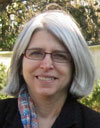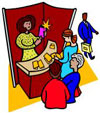| |
|
|

|
|
ATLAS |
|
|
Assistive
Technology
Laboratory
at
Stanford |
|
|
|
Technology
and design benefitting individuals with disabilities and older adults in the
local community |
January 18, 2017 |
|
|
|
|

Perspectives is the newsletter of the
Stanford course,
Perspectives in Assistive
Technology.
This issue invites you
to attend this second guest lecture,
encourages your participation in the
course's Assistive Technology Faire,
and solicits project suggestions for
Mobility and Older Adults.
|
Perspectives in Assistive Technology is a Winter
Quarter Stanford course - now starting its eleventh year - that explores
the design, development, and use of assistive technology that benefits people
with disabilities and older adults. It consists of semi-weekly classroom
discussions; lectures by notable professionals, clinicians, and
assistive technology users; tours of local medical, clinical, and
engineering facilities; student project presentations and demonstrations; an
assistive technology faire; and a film screening. |
Thursday, January 19th at
4:30pm:
|

|
Bridging the Gap between
Consumers and Products in Rehabilitation Medicine
Deborah E. Kenney, MS, OTR/L
Stanford University, VA Palo Alto Health Care
System, and Foothill College |
Abstract: Occupational therapists (OTs) are
critical players in the transdisciplinary rehabilitation team. An OT's job is
to help people, who because of illness, injury, or aging, have experienced a
decrease in their ability to function independently in the areas of daily
living, work, play, and leisure. Treatment by an OT often includes the
prescription of assistive technology. This talk will focus on the aspects
necessary to effectively fit the technology to the individual and support the
use of this technology in the home environment, and the impediments to
providing this.
Biosketch: Deborah Kenney has been an
occupational therapist working with stroke survivors and hand patients for the
last 25 years. She currently splits her time, as a researcher, between Stanford
and the VA Palo Alto Health
Care System. She has collaborated on numerous design / development research
projects with both engineers as well as with graduate, medical, and
undergraduate students. Her work includes testing and integrating technology
into the rehabilitation setting with individuals with Parkinson's Disease, CVA
(stroke), spinal cord injury, hand and orthopedic surgery and rehabilitation,
and balance problems related to aging. Ms. Kenney currently works with
researching problems of hand rehabilitation and treatment related to post
surgical pain and thumb arthritis and continues to develop novel treatments for
post-stroke survivors privately in the community.
|
Attend a lecture - The
schedule of guest lectures has been finalized.
Class sessions will be held on Tuesdays and Thursdays from
4:30 to 5:50pm and are open to the greater
Stanford community. You are most welcome to sit in on any class sessions that
interest you. You need not be a Stanford student and there is no required
signup, enrollment, or charge. The class will meet in a large, tiered,
accessible classroom on campus in the Thornton Center, adjacent to the Terman
Fountain and near the Roble Gym, the same venue as last year. Here are the
parking options, maps, and directions to
the classroom. |
 |
|
|
Did you miss a lecture? - Course
lectures are posted on YouTube. To find the links, browse to the
Lecture Schedule webpage, scroll down and click
on the lecture of interest. Near the bottom of the page you will see the
Lecture Material section which has links to the slides, photos, weblinks, and
lecture video. |
 |
|
|
Participate in the Assistive Technology Faire -
This fifth annual course event will provide an opportunity for students
and community members to get an up-close look at a variety of assistive
technology devices and learn about available services. Users of assistive
technology products as well as small companies and agencies
serving individuals with disabilities and older adults are encouraged to bring
assistive technology devices and information to display, demonstrate, and
discuss. Please browse to the Call for Assistive
Technology Faire Participants webpage and contact me if you would like to
be a part of this event as a user or vendor of assistive technology products or
services. Everyone is welcome to attend the faire.
The
Faire starts at 4:30pm on Tuesday, February
14th just outside the classroom, Thornton 110.
Here
are Dave's photos from last year's
Faire. |
 |
|
|
Solicitation for Mobility Projects for Older
Adults
A
capstone course is the academically integrative experience of an
undergraduate educational program that gives students an opportunity to
demonstrate the knowledge and skills they have gained during their time in
college. This experience helps prepare them for their engineering
careers.
ME113
- Mechanical Engineering Design - is a capstone course for seniors in
Mechanical Engineering at Stanford. In this course, students pursue on
"real-world" engineering problems offered by a company or other organization
(project partner).
Starting from a description of project goals provided by the project
partner, a student team of four seniors will develop a design concept and
explore its practical feasibility by fabricating and testing a series of
increasingly refined working models. Each project will supervised by a faculty
member using information and advice supplied by the project partner.
The
course will be conducted in the 10-week Spring Quarter from April through
mid-June.
One of
the themes this academic year is Mobility for Older Adults with a focus
on automobiles and driving.
At
this time, the course is soliciting problems or challenges that could be
addressed by a team of students.
The
best suggestions will be those that represent real problems experienced by an
individual with a disability or older adult in the local community that affects
their ability to drive or otherwise access transportation. Other suggestions
that broadly affect one's ability to walk or move are also welcome.
Please
email me your suggestions describing the problem and important features of what
a solution should do, but not how to achieve them. Thank you for your
consideration. |

 |
|
Support the course -
Funding in any amount for the course and student projects is always welcomed.
Monetary gifts support approved project expenses, administrative costs,
honoraria for guest lecturers, and the end-of-term celebration. Refer to the
Team Project Support webpage for more
information.
Email questions, comments, or
suggestions - If you have general questions, comments, or
suggestions about the course, email
David L. Jaffe, MS, the instructor. Thank you again for your interest in
the course.
Dave
|

To unsubscribe from this newsletter, please email
Dave. |
|








